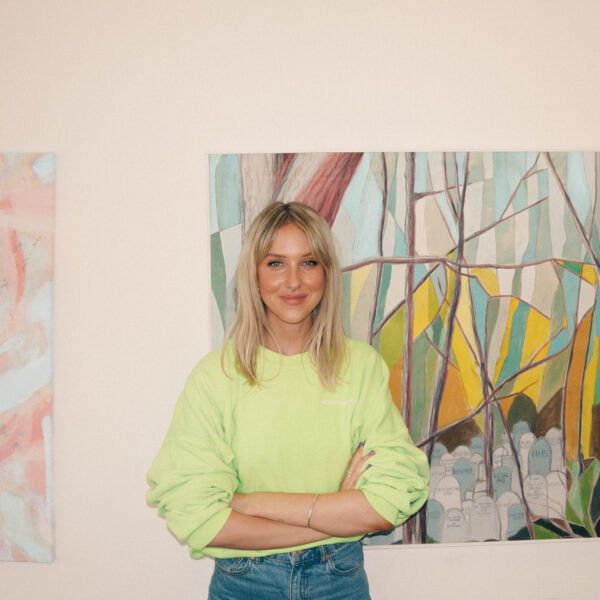
Natasha Collie
Senior Brand Marketing Manager at Penguin Random House UK
At the start of the year, Ladybird Books approached Sonder & Tell with a dream brief. In 2021, a year that’s been particularly challenging for...
In conversation with
Editor of Courier Magazine

Daniel Giacopelli is a man with his finger on the pulse of London’s heartbeat. You’d have to be as the editor of Courier Magazine, the publication known for reporting on modern business and startup culture, and what you should be seeing, experiencing and talking about.
From its humble beginnings as a free newsprint title in 2013, Courier has cast its net into the wider world of brand partnerships, workshops, talks and events, re-emerging as a paid-for magazine, free London paper and host of Courier Live, bringing the pages of the magazine into real life.
“I love print and I love magazines but there are some things you can only do in person. There’s nothing like getting a group of smart people in a room together and seeing what happens.”
Courier seems to be moving with ease through the oftentimes complicated realm of online/offline communication, enabling a culture of fast-paced, forward thinking business know-how to reach its community.
Adventure, space, travel, espionage. Stories of normal people on a journey or facing huge challenges.
For the first few years, Courier was a free mag focused on London’s startup scene. London is important to us because (most of) the team is based here, but we were dying to tell stories from everywhere else in the world, too. So, we’ve since more than quadrupled the page-count, added new sections, expanded the editorial focus to the entire world, stuck on a £5 price tag and grown our distribution to a few dozen countries. The look and feel have evolved, but you can draw a very clear editorial line from Issue 1 to 31, currently on newsstands.
Definitely a startup environment. We’re a small media company but growing really fast. Being a startup allows us to be nimble. The team gets the chance to work on different projects across the business, from commercial and editorial to film and events.
I love print and I love magazines but there are some things you can only do in person. We host regular talks about various modern business topics, from prop-tech and food delivery to wellness. Last year our team turned into shopkeepers for a few weeks; we ran a pop-up Christmas market just off Redchurch Street in Shoreditch, bringing on amazing small brands and hosting a series of talks on retail. We’re also running the 2nd edition of our big festival, Courier Live, on 1st November: 3 stages, 30+ speakers, 1500+ attendees, hands-on workshops, a brand marketplace, street food and a lot more. There’s nothing like getting a group of smart people in a room together and seeing what happens.


Brand partnerships are an important part of our business as it’s allowed us to avoid having to raise a lot of investment – but we’re very careful about it. The work and the brand need to be right. We’re all about helping solo founders and small businesses, so it’s important our partners are compatible. Sometimes our work appears in the mag or newspaper; other times we produce white-label work (films, podcasts, magazines, campaigns) the way an agency would.
One of our partners is Mailchimp. They’ve got a fantastic platform focused on helping small businesses improve their marketing and sell stuff. On the flip side, attracting customers and boosting customer loyalty are some of the top things our community tell us over and again they need help with. So, earlier this year we pitched Mailchimp on a marketing supplement in the magazine and also a workshop at the Barbican in London to help founders understand the basics of marketing. The event sold out with 200+ people. Sometimes we work directly for brands too, like our partnerships with American Express. They run the successful Shop Small campaign every year but wanted to find a way to make it more editorially punchy. So, we developed a magazine that we produce on their behalf – it’s stocked in retailers across the UK.
Courier London is our free, city-wide, monthly newspaper all about London’s best food, drink and retail. We looked around and realised that no one is really owning the ‘what are some cool things happening in London this month?’ territory. Obviously there’s Time Out and some digital properties – but nobody was applying Courier’s particular taste filter on local restaurants and shops. So, our newspaper is now stocked in 700+ places around London, from cafes and members clubs to hotel lobbies and co-working spaces. It’s essentially a primer on all the most interesting new openings in the capital, with Q&As, interviews, mini-profiles, tons of fun illustrations, recipes and more. We’ve got plans to launch local editions in a few interesting markets around the world. Watch this space.
We really jam-pack each issue with a ridiculous amount of stories. In Issue 27, though, I profiled a Native American couple living in Portland, Oregon – they’re both medical doctors during the day, but on nights and weekends they run the only Native American-owned premium denim brand, called Ginew. Their products are ridiculously cool and well-made and you just have to respect that level of intense hustle, passion and commitment. We put them on the cover. It’s the perfect Courier story.

The best pitches come either from PRs who really understand Courier’s mission – or from founders who explain in a fundamentally honest way why their story and business are interesting. As a bimonthly mag, we have fewer opportunities to tell stories than, say, a weekly such as The Economist (let alone a daily site such as TechCrunch); so, we’re really selective about what we write about. We have to turn down tons of things that are otherwise interesting, for the sheer reason of lack of space. On that note, many people pitching don’t realise that editors get literally hundreds of pitches a day. If yours is ignored it might just be bad luck or a particularly busy day. A polite follow-up a week later might work. But, I’d advise not to send an email and then immediately call the editor’s mobile – that might do the opposite of working.
Er… Courier. And our new podcast, Workshop. But for non-Courier stuff, you can’t go wrong with Harvard Business Review – the magazine itself and their many books. HBR is the gold standard of proper case study based, academic business insight. Elsewhere: Scott Galloway, the author and NYU professor, is absolute gold and doesn’t hold back what he really thinks about on everything from Uber to WeWork. Finimize is doing really good stuff with making financial news fun. And the CB Insights newsletter somehow manages to be chart-filled, data-based, stat-packed and absolutely hilarious.
“Many people pitching don’t realise that editors get literally hundreds of pitches a day. If yours is ignored it might just be bad luck or a particularly busy day. A polite follow-up a week later might work. But, I’d advise not to send an email and then immediately call the editor’s mobile – that might do the opposite of working.”
Here’s one: enough with the startup mythology and hyperbole. Tons of business reporting these days consists of glorified press releases filled with unicorns, college dropouts, the awesomeness of failure. But the reality is that, while tech startups are interesting, obviously, and we cover them all the time – they aren’t ‘special’. They’re just another type of small business. An AI-driven fintech startup isn’t fundamentally different than your neighbourhood dry cleaner around the corner; we’re just made to think it is because of how we contextualise it. At Courier we don’t consider the owner of an off-license as less worthy of dispensing business advice than Elon Musk – and you shouldn’t either.
Apartamento for the absurdly good design. Popeye for the glorious layouts and obscure Japanese brands. The New Yorker for the peerless long-form journalism.

Daniel's Storylist

Senior Brand Marketing Manager at Penguin Random House UK
At the start of the year, Ladybird Books approached Sonder & Tell with a dream brief. In 2021, a year that’s been particularly challenging for...

Founder Of Simple Politics
Talking about serious issues doesn’t mean defaulting into a serious tone of voice, or using complicated language. If anything, accessibility, clarity and a touch of...

Brand & Community Manager at Homethings
Creating a tone of voice from scratch can be challenging. But a blank slate to work from also mean there’s room for something a bit...

Executive Editor of No Man's Land

Editor at Daye